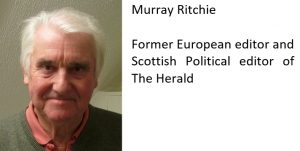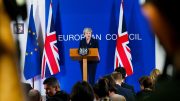Competing forms of nationalism are about to change the economic and political world order. And the decisive moment is coming soon when “good” nationalism and its “bad” counterpoint clash. No matter which wins the ascendancy, the outcome will affect us all, writes Murray Ritchie.
In the British House of Commons the prime minister, Boris Johnson, has taken to riling his Scottish National Party opponents by referring to them inaccurately, but deliberately, as the Scottish Nationalist Party.
This is more than just a simple mistake. It is an old act of mischief first practised by a former Labour Party first minister of Scotland, Jack McConnell, in the early years of the Scottish Parliament. McConnell knew that the SNP opposition in those days disliked being called nationalists, despite the name of their party.
A few, notably the then leader Alex Salmond, defiantly boasted of being nationalists but the majority bridled at the tag because of its unwanted association with nationalism’s ugly side – which of course is why the SNP’s opponents happily persisted with the practice.
Johnson and his BritNat nationalism will obstruct Indyref2 for as long as possible but he can’t block it for ever.
No-one, not even Boris Johnston, can truthfully claim that he and his political soulmate, Donald Trump, have much in common with Nicola Sturgeon, the SNP first minister of Scotland. She and the SNP are nationalists of a very different stripe.
Trump and Johnson are undeniably nationalists because their politics could never be described as internationalist. Johnson is preoccupied with ending Britain’s decades of European Union membership, turning his back on 47 years of partnership with the continent, yet finds time to attack Scottish independence campaigners in the Scottish National Party as separatists.
He has quite a nerve. In the modern history of British politics there has been no greater British nationalist prime minister – in peacetime of course – than Boris Johnson with his reputation for xenophobia and suspect racial views. Witness his description of black children as piccaninnies with watermelon smiles and Muslims looking like bank robbers and pillar boxes.
Trump with his crude America First philosophy is prepared to disrupt trade around the world in the interests of old-fashioned and discredited protectionism if it benefits the United States in some – any – way. He is a nationalist to whom internationalism is, deep down, a foreign concept to be approached only with deep suspicion. America under Trump has become something of a pariah.
For people like Johnson and Trump to denounce the SNP as irresponsible because they are nationalist by name and philosophy – as both have done – really is a bit rich. But it can sting. Many Scottish National Party activists dislike their party’s name precisely because they don’t see themselves as nationalists. Far from it. They see themselves as independence campaigners, most of whom are social democrats, friendly to immigrants and racial minorities and who want Scotland to play a full part in the world in a way which the United Kingdom firmly forbids.
There are renewed mutterings now about the SNP dropping the word “national” and calling itself simply the Scottish Party or the Scottish Independence Party.
SNP politicians insist they are internationalists. “To be a nationalist you first must be an internationalist” is a phrase many SNP figures have used down the years. When Winnie Ewing, the SNP’s grande dame of 20th century politics, entered Westminster as an MP her rallying cry was: “Stop the world, Scotland wants to get on”. Hardly the rallying cry of a Johnson or Trump-type nationalist.
Right now, the independence movement in Scotland sees British nationalism as the enemy. Ditto the Catalans and other regional peoples in Europe who have problems with unyielding central governments. It is this inward-looking nationalism, mainly English it has to be said, which brought about Brexit and which prevents the pro-EU Scots electorate having a second independence referendum.
Scotland’s indyref2 campaigners denounce this as so-called BritNat intolerance – the uglier flip side of nationalism with its anti-democratic face as championed by people like Johnson.
Scotland is not a perfect example of faultless tolerance in this difficult time for the UK. BritNat influence is present north of the Border, too. Observe the 38 per cent of voters who supported Brexit and those others, perhaps half of voters, who remain unconvinced about independence.
In the modern history of British politics there has been no greater British nationalist prime minister – in peacetime of course – than Boris Johnson with his reputation for xenophobia and suspect racial views.
Brexit is blamed now for a spike in hate crime in Scotland where recently there has been disturbing evidence of rising anti-Muslim hostility. This embarrasses the independence movement which prides itself on its support for immigration and the promotion of racial harmony. But so far at least this disturbing presence involves a very small minority.
These conflicting forms of nationalism will inevitably meet head on soon. First the UK Conservative government’s attempt to find an advantage to Brexit – which half the country believes does not exist – begins this week with the quest for a free trade agreement. Soundings from the EU are not encouraging and a no-deal outcome is distinctly possible.
Could it be that the EU, enjoying the upper hand in these negotiations, will succeed in deflating this British nationalism or will Johnson’s belligerent approach prove successful?
Either way the Scots appear set on a different national path, with more than 50 per cent favouring an Indyref2 and about 50 per cent favouring independence. Johnson and his BritNat nationalism will obstruct Indyref2 for as long as possible but he can’t block it for ever.
Meanwhile, siren sounds from Brussels – where there is significant sympathy for Scotland – are music to the ears of the SNP and ‘Yes’ campaigners, most of whom want a return to the EU even if resuming membership might be years away.
Whatever the outcome, the results of these rival forces will have profound effects on the economy of the UK, with or without Scotland, and of the EU.
This shock will reverberate for good or ill across Europe and much of the world. Add to the mix another term in office for Trump – quite possible as of today – and a resurgent China and India, and the world’s economic and political order will soon be startlingly different.

Featured Image Credit: Lightspring/Shutterstock.com




